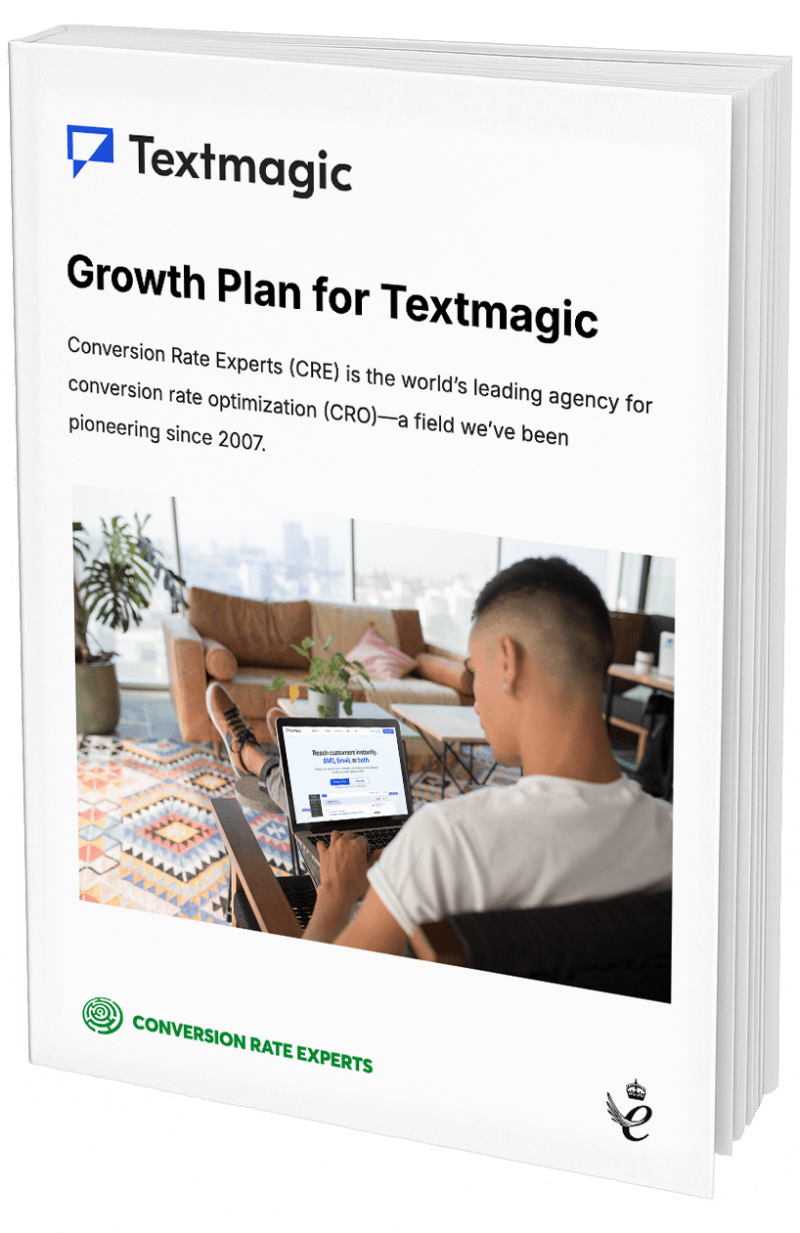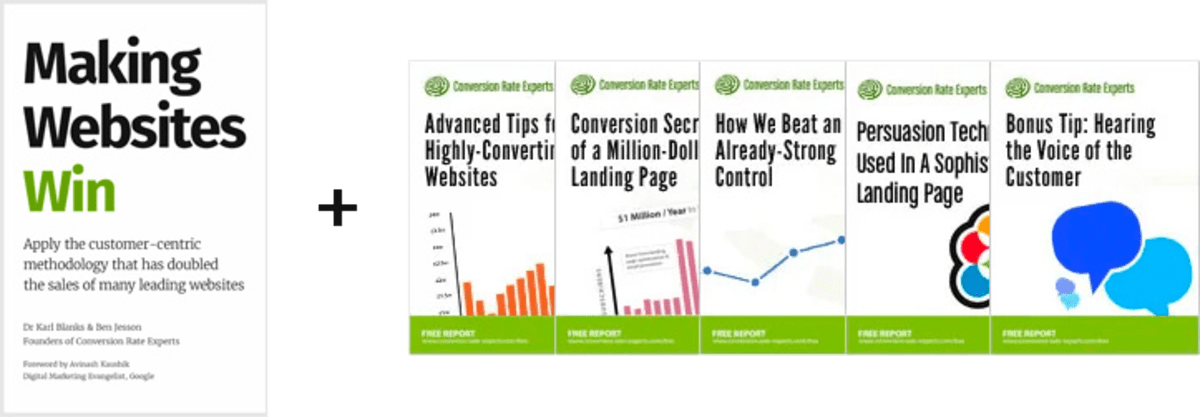Five golden questions that reveal exactly why your visitors aren’t converting
(By the way, to get articles like this free in your inbox, subscribe to our newsletter.)
We’ve spent years refining our approach to customer surveys. In that time, we’ve distilled hundreds of possibilities into five essential questions that yield the most valuable insights.
In the following article, you’ll learn our proven approach to customer surveys, as well as:
- The most effective people to ask—it may not be who you’d expect.
- The “golden questions” we use to reveal why visitors aren’t converting.
- Five principles that will further accelerate your results.
Although many companies use surveys, far fewer manage to systematically extract actionable information that boosts their conversions. Read on to see how.
What we need to know about our visitors

In an ideal world—let’s call it Conversiontopia because that’s fun to imagine—a company would know everything about its visitors and use that knowledge to create products and services that its customers love. (That’s a beautiful path to higher conversion rates.)
In reality, few businesses understand their users completely. It’s also easy to be paralyzed by the infinite questions we could ask our audience. So, let’s focus on a simpler question: What don’t we know?
At a fundamental level, it’s incredibly useful to understand five high-leverage things about our visitors:
- How they found us.
- What appeals to them about our brand, products, or services (attractors).
- How they view us in comparison to others.
- What puts them off our products or services (detractors), and…
- Their biggest frustration in finding the right product or service.
If we start with these areas in mind, it’s far easier to identify the gaps in our understanding and systematically fill them in.
Each of our questions targets one of the areas above, but before we reveal them, let’s look at who it makes the most sense to survey. They might not be who you’d expect.
Who should you survey?
If our goal is to increase our conversion rate, who do we ideally want to talk to?
The answer is qualified non-buyers. These are people who are genuinely in the market for a product or service like ours, have visited our website, but didn’t convert. Changing their minds is the fastest way to increase our conversion rate, right?
Well, yes, but there’s a problem.
Qualified non-buyers are hidden inside the much larger group of everyone who didn’t buy. Imagine that you sell a SaaS writing suite. Your software might be a huge boon for students doing a dissertation, and they might well land on your website after a Google search, but none of them are in the market for your subscription pricing. If you survey them, they’ll likely tell you that your product is too expensive.
So students aren’t “qualified” prospects. Neither are many of those coming to your site for their own reasons. Examples might include people searching for job opportunities, competitors looking at your pricing, vendors after a telephone number, or partners confirming your address for a meeting. They aren’t there to buy and will not convert (however good your website is).
It’s often impossible to distinguish between a qualified visitor who leaves your site and an unqualified visitor… who leaves your site.
So, what’s the next best group that we can easily target?
Customers who bought moments ago
Customers who have just bought your product or service are definitely qualified buyers. And we know exactly who they are—so they’re easy to survey. We can ask them a question moments after their purchase via a thank you page, confirmation email, or pop-up survey.
But can we get the insights from them—do they have the same objections that people who didn’t buy have? Well, yes. It just happens that they were able to overcome those objections.

Think of it as asking someone who completed an obstacle race which obstacle was the hardest to get over. Those who finished—those who purchased or signed up—are well aware which obstacles were the toughest. Once they’ve caught their breath, if we asked them to walk us back to the hardest obstacle and look behind it, we’d likely find loads of qualified non-buyers who didn’t manage to make it over.
We can use the insights from those who finished the course to remove or reduce the difficulty of the obstacles—to increase the conversion rate for future visitors who might otherwise leave without buying.
That is, as long as we know the right questions to ask.
The five golden questions
Each of the golden questions targets one of the high-leverage areas mentioned above.
1. Where exactly did you first find out about us?
Objective: Identify the source of your traffic.
Why it matters: Knowing where your visitors come from helps you determine which marketing efforts are paying off and where you might increase your efforts.
Best practices:
- Open-Ended Responses: Encourage detailed answers by providing a text box instead of a drop-down menu.
- Follow-Up: If responses indicate multiple sources, consider a follow-up question to delve deeper into the most influential source.
Example insight: A customer might say, “I first heard about you at the XYZ conference, where a colleague mentioned your product during a workshop.” This might guide you to invest more in conference marketing.
2. What persuaded you to purchase from us?
Objective: Understand your unique selling points from the customer’s perspective.
Why it matters: This question helps you identify what factors or features are most compelling to your buyers, which will often differ from what you assume.
Best practices:
- Encourage Specificity: Ask for specific features, benefits, or aspects of your product or service.
- Segment Responses: Group similar responses to identify common themes and prioritize them in your marketing efforts.
Example insight: Customers might highlight your excellent customer service and fast shipping as key factors, even if you initially thought it was your competitive pricing.
3. Which other options did you consider before choosing our product?
Objective: Understand your competitive landscape.
Why it matters: Knowing your online (and offline) competitors can reveal unexpected insights into your market position and customer preferences.
Best practices:
- Include all competitors: If necessary, customize your question to cover both direct and indirect competitors. For example, if Nintendo asked customers what other “game consoles” they considered, it’s unlikely that the company would learn anything new. However, if the question is reframed around competing “leisure activities,” the broader feedback may reveal valuable nuggets that can improve future development and marketing. (Nintendo’s consoles prioritize fun and social gaming, so evolving leisure trends would seem highly relevant.)
- Look for the “why”: Find patterns that help you understand your broader competitive landscape. Why did someone look elsewhere? What competitor feature nearly lost you that sale?
Example insight: When we worked with GoHenry—an educational bank account for children—we found that prospects were comparing the service to free bank accounts. GoHenry wasn’t free, but this insight helped us combat the misconception. By emphasizing the service as a financial education tool, we changed the “frame of reference” and showed how low the price really was.
4. What’s the one thing that nearly stopped you buying from us?
Objective: Identify and mitigate potential obstacles.
Why it matters: Understanding the hesitations and concerns that nearly deterred your buyers can help you address these issues for future customers.
Best practices:
- Immediate feedback: Ask this question immediately after purchase to capture fresh insights.
- Share the feedback: Make sure that the feedback goes to the relevant teams. (This seems obvious, but it’s surprising how often valuable insights are siloed away from the people who can act on them.)
Example insight: A customer might mention that they were unsure about the return policy, prompting you to make it more prominent and clear on your site.
5. What was your biggest challenge, frustration, or problem in finding the right product or service online?
Objective: Uncover pain points in the customer journey.
Why it matters: This open-ended question can reveal a wide range of issues that customers face, providing insights into various aspects of their experience. Never mind that you may receive impractical ideas; all you need is one great idea you haven’t thought of.
Best practices:
- Encourage detail: Ask for as much detail as possible to understand the context of their challenges.
- Categorize responses: Group similar responses to identify major areas for improvement.
Example insight: When we worked with Norman Records, we discovered that record buyers were incredibly fearful of damage during shipping and struggled to find comprehensive information on the quality of the packaging.
Simple ways to accelerate your results
Companies that run effective surveys tend to follow a few basic principles:
- Less is more: It’s better to ask fewer, more targeted questions than to overwhelm respondents with a lengthy survey. Shorter surveys often result in higher response rates and more thoughtful answers.
- Choose the best moment: Send surveys immediately after a purchase or interaction to capture accurate and relevant feedback.
- Incentivize participation: To encourage more responses, offer small incentives, like discounts or entry into a prize draw.
- Follow-up: Send a thank-you email to respondents and inform them of any changes made based on their feedback. You’ll be amazed how surprised and delighted these people often are.
And finally:
- Act on the responses you receive: Gathering data is pointless if you don’t act on it. Ensure you read and utilize the feedback.
Bringing it all together
Surveys work. If you ask the right questions at the right time, your visitors will tell you why they aren’t converting. The golden questions help us target what we don’t know and systematically fill in the gaps. Surveying recent customers is the best way to pull the signal from the noise and make fast progress.
Remember, the goal isn’t just to collect data but to gain meaningful insights that you can act on to drive your business forward.
We’ve refined the golden questions from hundreds of options over thousands of surveys. They work, and asking them can be the start of a virtuous circle. You may not reach Conversiontopia right away, but you’ll be taking a huge step forward.
The more you understand your visitors, the better you can serve them, and the better you serve them, the more of them will become your customers.
For more on surveys—and a full explanation of our methodology— download a free copy of our Amazon #1 bestselling book, Making Websites Win.
And finally, a question for you
Thanks for reading this article. Here’s a special question for you:
What’s your biggest challenge, frustration, or problem with growing your business?
Let us know using this quick form. We want to create content that truly helps you, so we promise to read every response.
How much did you like this article?
What’s your goal today?
1. Hire us to grow your company
We’ve generated hundreds of millions for our clients, using our unique CRE Methodology™. To discover how we can help grow your business:
- Read our case studies, client success stories, and video testimonials.
- Learn about us, and our unique values, beliefs and quirks.
- Visit our “Services” page to see the process by which we assess whether we’re a good fit for each other.
- Schedule your FREE website strategy session with one of our renowned experts.
Schedule your FREE strategy session
2. Learn how to do conversion
Download a free copy of our Amazon #1 best-selling book, Making Websites Win, recommended by Google, Facebook, Microsoft, Moz, Econsultancy, and many more industry leaders. You’ll also be subscribed to our email newsletter and notified whenever we publish new articles or have something interesting to share.
Browse hundreds of articles, containing an amazing number of useful tools and techniques. Many readers tell us they have doubled their sales by following the advice in these articles.
Download a free copy of our best-selling book
3. Join our team
If you want to join our team—or discover why our team members love working with us—then see our “Careers” page.
4. Contact us
We help businesses worldwide, so get in touch!
© 2026 Conversion Rate Experts Limited. All rights reserved.















